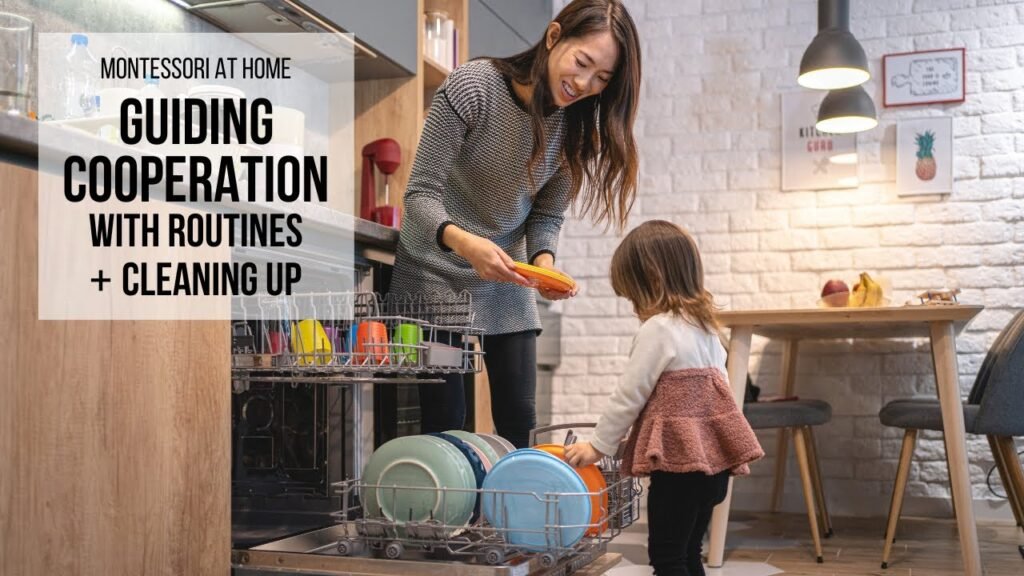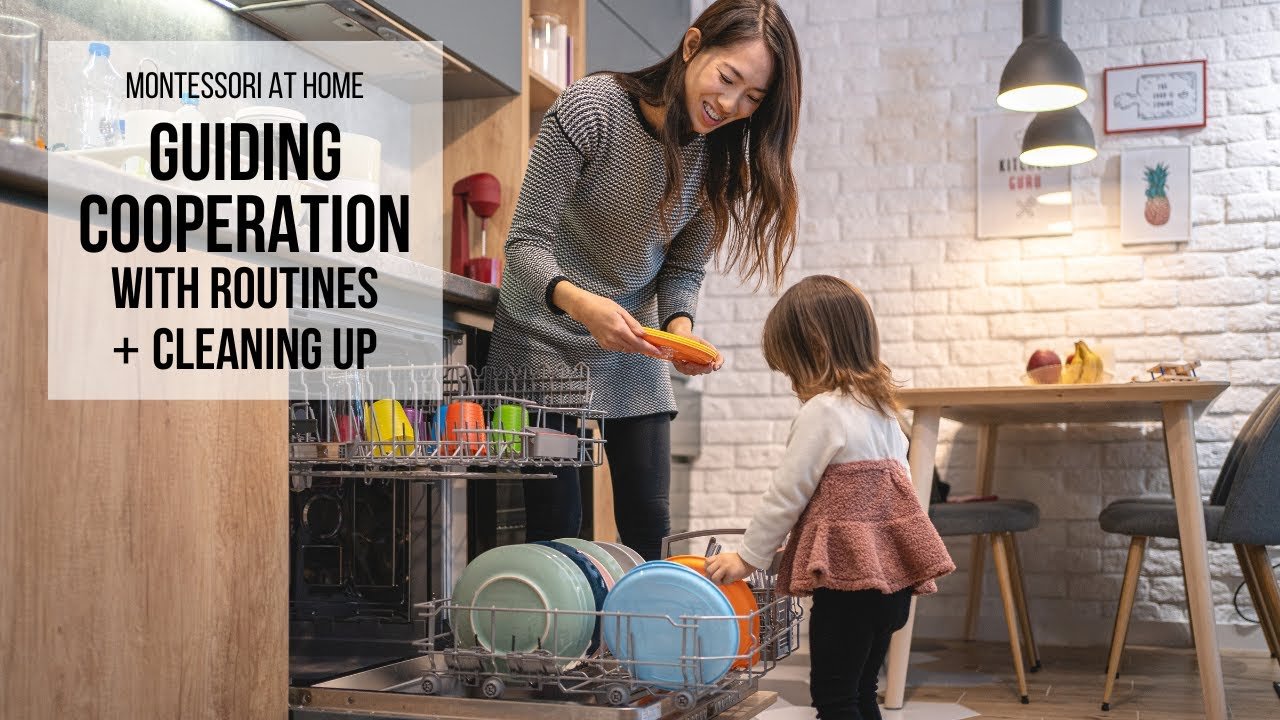Hey there! In this article, titled “Guiding Cooperation with Routines and Cleaning Up at Home: Montessori Parenting Tips by Hapa Family,” we will explore helpful ideas for parents of young children in line with Montessori parenting principles. The article revolves around a video created by Hapa Family, where the parent discusses their struggle in getting their almost four-year-old boy dressed and motivated for the day. We will delve into strategies and experiments that can be tried to find what works for the child in terms of motivation, such as offering choices, planning the night before, and gradually letting the child take more responsibility for getting dressed. Additionally, we will explore advice for cleaning up after meals, including giving clear directives, providing reminders, and gradually allowing the child more independence in the task. The goal is to gradually build the child’s independence while respecting their individual interests and motivations. So, let’s dive into these Montessori parenting tips and gain insights on how to optimize cooperation with routines and cleaning up at home!
Section 1: Introduction
Overview of the video
In this video, titled “MONTESSORI AT HOME: Guiding Cooperation with Routines + Cleaning Up,” the content creator, Hapa Family, addresses a common struggle many parents face – getting their children dressed and motivated for the day. The video aims to provide helpful tips and strategies for parents of young children, in line with Montessori parenting principles.
Content creator information
The video is created by Hapa Family, a mom named Ashley with two daughters, Kylie (five years old) and Mia (three years old). Ashley uses her own experiences and knowledge to share practical advice and guidance for other parents.
Disclaimer and affiliate links
It is important to note that the video is not sponsored, and the opinions expressed are solely those of the content creator. Ashley may include affiliate links in the video’s description, meaning she may receive a small commission if viewers make purchases through those links. However, this does not result in any additional charges for the viewers.
Target audience
The video is intended for parents of young children who are interested in implementing Montessori parenting principles in their daily lives. It offers practical guidance and ideas to help parents navigate the challenges of guiding cooperation and fostering independence in their children.
Section 2: Understanding Montessori Parenting Principles
Explanation of Montessori parenting
Montessori parenting is a child-centered approach that emphasizes independence, respect for the child’s individuality, and a prepared environment to foster learning and development. It is based on the educational philosophy of Maria Montessori, an Italian physician and educator.
First plane of development
The child mentioned in the question is in the first plane of development, which spans from birth to age six. During this period, children have absorbent minds and consciously make decisions about their environment. They are actively learning and developing their independence.
Individual differences in children
It is important to recognize that every child is unique and may have different interests, motivations, and developmental timelines. What works for one child may not work for another. Montessori parenting principles acknowledge and respect these individual differences.
Importance of motivation
Motivation plays a crucial role in fostering cooperation and independence in children. While some children may naturally be more motivated to engage in certain tasks, others may require additional strategies and encouragement. Experimenting with different approaches can help find what works best for each child.

Section 3: Guiding Cooperation with Routines
Introduction to guiding cooperation
Guiding cooperation involves finding strategies to motivate and inspire children to willingly participate in everyday routines and tasks. This cooperation is essential for building their independence and sense of responsibility.
Struggling with getting dressed and motivated
The parent in the video mentions that their almost four-year-old boy struggles with getting dressed and lacks motivation for daily tasks. This is a common challenge many parents face. Understanding the child’s development stage and individual needs is crucial in addressing this issue effectively.
Importance of routine cards
Routine cards are a common tool used in Montessori parenting to provide visual cues and structure for children. However, it is important to acknowledge that not all children respond to routine cards in the same way. If routine cards are not effective for a child, other strategies can be explored.
Finding what works for the child
Parents are encouraged to experiment and try different strategies to find what motivates their child. This may involve offering choices, planning the night before, and gradually increasing the child’s responsibilities. Each child is unique, and it is important to tailor approaches to their individual needs.
Offering choices for motivation
Allowing children to make choices can increase their motivation and sense of control. For example, parents can offer two outfit choices for the child to pick from the night before. This helps simplify the decision-making process and make the morning routine more enjoyable.
Planning the night before
Planning and preparing for the morning routine the night before can minimize stress and resistance. Selecting clothes, organizing items, and setting up the environment can help create a smooth and efficient morning routine.
Gradually allowing more responsibility to the child
Parents can gradually increase their child’s responsibility in the getting dressed process. Initially, they can provide hands-on assistance and encourage the child to take small steps, such as putting one leg in their pants or pulling them up with guidance. Over time, the child can take over more tasks independently.
Flexibility in the morning routine
Flexibility is key when guiding cooperation in the morning routine. Recognizing that children may need more time or have off days is essential. It is important to remain patient, offer support when needed, and adjust expectations based on the child’s pace.
Section 4: Cleaning Up at Home
Introduction to cleaning up
Cleaning up after meals and maintaining a tidy home environment is another important aspect of Montessori parenting. Teaching children to clean up helps promote independence, responsibility, and respect for their surroundings.
Strategies for cleaning up after meals
Parents can implement strategies to make cleaning up after meals a more cooperative process. This can include involving the child in simple tasks like clearing their plate or placing it in the sink. Setting clear expectations and modeling helpful behavior can also encourage participation.
Giving clear and positive directives
When guiding children in cleaning up, it is important to provide clear and positive directives. Using simple language and demonstrating enthusiasm can make the task more engaging and enjoyable for the child. Instead of focusing on what they did wrong, praise them for their efforts and celebrate their accomplishments.
Being ready to provide reminders
Children may need reminders to complete their cleaning tasks, especially in the beginning stages. As a parent, being prepared to provide gentle reminders and encouragement can help keep the process on track. It is important not to be too strict or impose unnecessary pressure, as this can lead to resistance.
Gradually allowing more independence
Parents should aim to gradually build the child’s independence in cleaning up. While they may need assistance initially, over time, children can take on more responsibility for tidying up after meals. This gradual increase in independence empowers them and fosters a sense of ownership and capability.
Helping on off days
Children may have off days or moments when they require more assistance with cleaning up. It is essential for parents to recognize and accommodate these moments with patience and understanding. Offering support without criticism or judgment is crucial for maintaining a positive environment.
Goal of building independence
The ultimate goal of guiding cooperation in cleaning up is to build the child’s independence. By providing the necessary tools, encouragement, and skills, parents can help their children take pride in keeping their surroundings clean and organized.
Section 5: Conclusion
Recap of key points
In this video, Hapa Family provides valuable insights and strategies for guiding cooperation with routines and cleaning up. Key points include understanding the child’s development stage, recognizing individual differences, and experimenting with different approaches to find what works best for the child.
Summary of Montessori parenting tips
Montessori parenting principles focus on promoting independence, respect for the child’s individuality, and creating a prepared environment. Tips discussed in the video include offering choices, planning ahead, gradually increasing responsibilities, and providing clear and positive directives.
Encouragement for parents to try different strategies
Hapa Family encourages parents to embrace flexibility and try different strategies when guiding cooperation and cleaning up. Every child is unique, and it may take time to find the approach that works best for their motivation and engagement.
Importance of flexibility and individualization
Flexibility and individualization are essential in Montessori parenting. Adapting to the child’s needs and allowing them to progress at their own pace fosters a positive and enjoyable parenting experience.
Closing thoughts by Hapa Family
Hapa Family concludes by emphasizing the importance of recognizing and respecting a child’s individual development and interests. The video serves as a reminder that parenting is a journey of learning and experimenting, and the process of guiding cooperation and fostering independence requires patience, understanding, and adaptability.

